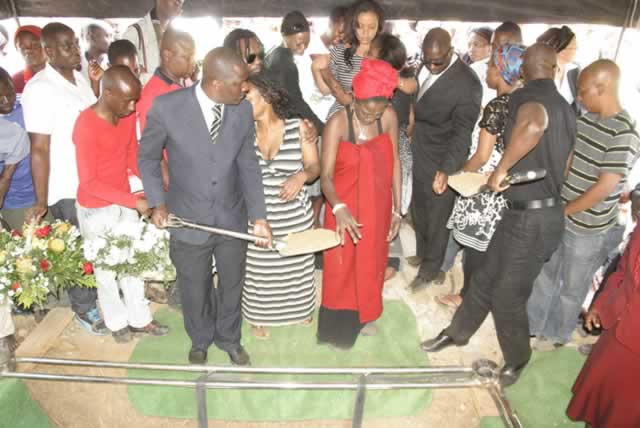Maraire family blasted

Jonathan Mbiriyamveka Entertainment Reporter
Music fans have criticised the late Chiwoniso Maraire’s family for using her death to settle old scores. Others described the whole saga as a last attempt to extort money from friends and colleagues during the hour of mourning. In what became an embarrassment to the community, Chiwoniso’s body was kept in the car during her funeral wake in Harare on Sunday and at her rural home in Chakohwa on Monday night as family feud took centre stage.
Whether or not this was the appropriate way of handling the traditional custom, it appears the late mbira icon was condemned even in death.
“Why would they keep Chiwoniso’s body outside her home when she used to live there?” asked one irate fan.
Another mourner cited unfairness on the part of Chiwoniso’s family saying she deserved more than what she got from her own people.
“For me the family seems not worried about the death but instead they want to make a point but that is not the best way to wash dirty linen in public,” Fadzai Mutambara said.
An elder from Chakohwa village only identified as Sekuru Shoko said the family should have solved their differences through traditional means.
“What we have noticed is really embarrassing and should have been avoided because she was a well-known figure in the arts. It is our culture that we should honour the dead but what we have just seen is unAfrican,” he said.
Traditionally, the body is supposed to lie in state in the house but Chiwoniso’s body was denied entry much to the chagrin of the village elders and mourners who questioned why she wasn’t given a proper send-off worthy of a mbira icon.
Consequently, the family was fined US$50 by the village elders for breaking a traditional custom.
Worse still, there was no body viewing or graveyard speeches as is the norm but rather, mourners were addressed at the home by guest of honour Deputy Prime Minister Professor Arthur Mutambara, Zanu-PF parliamentary candidate Cde Monica Mutsvangwa as well as Pastor Charles Charamba who preached before he led mourners in prayer.
Professor Mutambara described Chiwoniso as a unifier not only to her family but also to Zimbabweans as seen by mourners from across the political divide who thronged Chakohwa village during the funeral wake. Members of the main two political parties Zanu-PF and the MDC-T were clad in their party regalia celebrating a life well lived.
He also said Chiwoniso was a cultural ambassador who took Zimbabwe beyond borders and urged Zimbabweans to preserve their culture and identity.
Wild applause
“She not only unified her own family or Andy Brown’s family but also all the Zimbabweans through her music. She performed Zimbabwean music beyond our borders because she was a cultural ambassador,” he said to wild applause from the crowd.
Cde Mutsvangwa also hailed Chiwoniso as a heroine of Zimbabwean arts and culture. She said Chiwoniso remained committed to her culture even though she was born and raised in the United States.
Dub poet Albert Nyathi, who was a friend to Chiwoniso, said she was a talented musician who transcended racial barriers.
“Just days before her death Chiwoniso and I were busy working in the studio and she helped me a lot with ideas and I even told her that she would make a good producer. After finishing recording she then told me that she had a chest infection and she promised to return. That’s when I got the sad news. Her feel of music cut across all racial barriers and I will forever cherish the moment I worked with her,” he said.
Josh Hozheri, one of the music promoters who worked with Chiwoniso, commended the mbira queen for inspiring other women to pursue music as a career.
“She was understanding and she loved everybody. She worked with so many people in music and was passionate about her music,” he said.
Upcoming mbira songstress Hope Masike described Chiwoniso as an inspiration.
“Her music was so amazingly great . . . how is it that we only seem to see this, or appreciate this better now that she is gone? Am I wrong to say that it was wrong to make our own Zimbabwean music legend, Chiwoniso, open for Lira?
“Lastly, I play mbira. I love mbira. I love mbira music. I love what I got from Chiwoniso but I will never ever fit into her shoes . . . they are way too big,” she said.
Jazz maestro Victor Kunonga said he had lost a sister, friend and advisor.
“She was my everything . . . a sister, friend and advisor I will remember her for all the time we shared together,” he said.
The mbira star’s death came just over a year after her ex-husband Andy Brown died.
An accomplished singer, songwriter and exponent of Zimbabwean mbira music, Chiwoniso was born on March 5, 1976 in Olympia, United States of America.
She was the daughter of renowned Zimbabwean mbira player and teacher Dumisani Maraire.
Advanced Level
At the age of 15, she returned to Zimbabwe with her family and attended Mutare Girls’ High School for Forms Three and Four before taking Advanced Level evening classes at the University of Zimbabwe where her father was a lecturer.
She cut her musical teeth with her father’s marimba groups, Dumi and Minanzi and Mhuri ya Maraire.
In 1991 Chiwoniso met two young hip-hop artistes Herbert Schwamborn and Tony Chihota, and formed Zimbabwe’s first afro hip-hop group Peace of Ebony.
They recorded an album From The “Native Tongue” in 1992 in Keith Farquharson’s studio, with Keith contributing much of the music and production.
Chiwoniso was honoured with the Decouverte Afrique by Radio France International after releasing her debut album “Ancient voices” in 1998.
The album entered the World Music Charts Europe three times and brought her a nomination in the category Best Female Vocals of Africa for the Kora Award in 1999.
From 2001 to 2004, she was a member of the multinational all-women band Women’s Voices, whose original members were from Norway, Zimbabwe, Tanzania, America, Israel and Algeria.
She also worked on soundtracks for movies and documentaries.
Chiwoniso had several albums to her name and played a role as one of the most revolutionary mbira players crossing all musical borders inspiring young Zimbabweans to play the mbira in a more modern and contemporary way.
She collaborated with various musicians and artistes across the world.









Comments